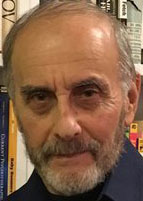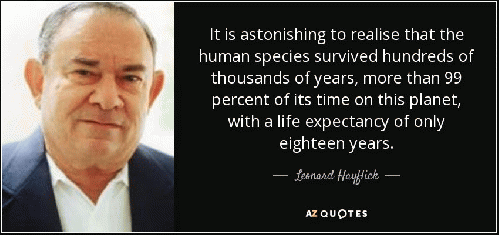How long can human beings live? Is there an outside limit? Do we know enough about aging to break through possible biological barriers? Is the current approach to curing "age associated diseases" like Alzheimer's flawed? Experts are sharply divided.
In 1962 eminent biologist Leonard Hayflick discovered that normal human fetal cells replicate a limited number of times. This phenomenon promptly acquired the moniker the "Hayflick Limit." Later, biologists Calvin Harley and Carol Greider provided the molecular explanation for the Hayflick limit with their discovery that telomeres, the DNA biological material in every cell of our bodies, diminish each time cells divide.
In contrast, cancer cells, which are immortal, produce an enzyme called telomerase that maintains the length of telomeres and enables cancer cells to replicate without limit. The strategy of extending the life of normal cells by injecting telomerase has proven thorny, as reported by Dr. Elizabeth Blackburn, co-discoverer of telomerase: "too much telomerase can help confer immortality onto cancer cells and actually increase the likelihood of cancer, whereas too little telomerase can also increase cancer by depleting the healthy regenerative potential of the body..telomerase shots are not the magical anti-aging potion...."
The finite capacity of normal human fetal cells to divide (on average about 50 times) suggested to Hayflick that aging is responsible for the end of normal cell replication and eventually death. Other researchers translated Hayflick's findings into a maximum human lifespan of 120 years.
A 2016 study at the Albert Einstein School of Medicine came up with a similar human lifespan limit of 115 years. The investigators drew their conclusion from surveys of longevity and mortality records in more than forty countries since 1900. While their findings showed an impressive increase in the number of people living beyond age 100 in recent decades, rarely did centenarians live longer than 115 years. One exception, Frenchwoman Jeanne Calment, died at age 122. She was a media sensation because she exceeded the traditional limit for longevity.
The dramatic increase in life expectancy from 18 years (at birth) in prehistoric times to an average of 79 in the U.S. today (and 1-4 years longer in more than 25 other countries) is not due to breakthroughs in our understanding of the biology of aging. Rather, it's been achieved through the reduction in infant mortality, public health measures such as clean water, improved sanitation, better nutrition, healthy life styles, and the remarkable boost when antibiotics and vaccines were introduced.
But is the Hayflick Limit fixed, or is it a biological barrier that can be penetrated? Opinions vary.
At one extreme, Cambridge University trained Dr. Aubrey de Grey, Chief Science Officer of the SENS Research Foundation for the study of aging claims that emerging breakthroughs in the biology of aging have brought human lifespan to the verge of vastly extended longevity--and perhaps immortality. The first person to live to 1,000 years is likely walking the earth right now, he declares.
I met Aubrey de Grey several years ago at a screening of the film To Age or Not To Age, sponsored by the International Longevity Center. He was one of the researchers featured in the documentary. Afterwards I approached him with a question.
"Do you think civilization is ready for immortality?" I asked, since immortality has obvious implications for the social, economic, and political functioning of society.
De Grey didn't like my question. He immediately launched into a lengthy rant. "Do you know how many people die each day and that it's not necessary," he remarked. "We have the means and knowledge..." I quickly realized that de Grey champions another version of right to life. So sure is he that death is not inevitable that he recoils at the idea that we dare think otherwise.
Dr. Leonard Hayflick takes a strong stand against De Grey's position on life extension. And he has little respect for those touting "cures for aging." The "fountain of youth" business, he says, is the first or second oldest profession.
What does Hayflick think of the work of MIT biologist Dr. Leonard Guarente I wanted to know. In 2016 Guarente generated a lot of fanfare when his newly formed company, Elysium, introduced a nutritional supplement called Basis. The main ingredient of Basis, nicotinamide riboside (NR), raises the body's levels of nicotinamide adenine dinucleotide (NAD), which in turn, Guarente claims, can slow the aging process by boosting mitochondria, the energy dynamo of cells that diminishes with age. While Guarente's Basis and anti-aging products of other companies may improve some aspects of bodily functioning, do they put the brakes on aging? Hayflick is doubtful if not dismissive of that notion.
I interviewed Dr. Hayflick on the telephone on October 27th and 29th 2016. He spoke from his home in Northern California. The strength of his voice, not to mention his convictions, belie his eighty-eight years. And he anticipates many productive years ahead, based on the principle that the best way to insure longevity is to pick your parents carefully. His mother lived to 106.
While he agrees that biology plays a role in longevity, Hayflick rejects claims that a genetic aging code is about to be broken, thus opening the floodgates for unlimited lifespans. In stark contrast to those who argue that researchers have accumulated a trove of knowledge about aging, Hayflick insists that "We know very little if not zero about the fundamental cause of aging."
(Note: You can view every article as one long page if you sign up as an Advocate Member, or higher).






